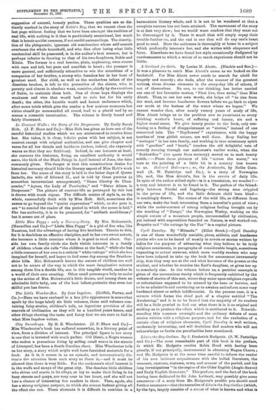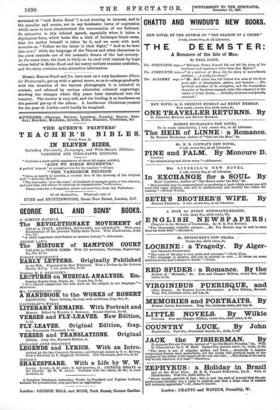Edwin the Boy- Outlaw. By J. Frederick Hodgetts. (S. W.
Partridge and Co.)—The most remarkable part of this book is the preface, in which Mr. Hodgetts credits Robin Hood with having been greatly, if not principally, instrumental in obtaining Magna Charta ; and Mr. Hodgetts is at the same time careful to inform the reader of his own intimate acqnaintance with the ballad literature, the manners, customs, costume, arms, and armour of the period, and his long investigations "in the region of the Older English (Anglo-Saxon) and Early English literature." This preface, and the fact of the book having been dedicated to Sir John Lubbock, may possibly give some assurance—if a story from Mr. Hodgetts'a prolific pen should need further assurance—that the narrative of Edwin the Boy.Oatlaw (which, • by-the-bye, largely consists of a recast of what is known acid what is surmised of "bold Robin Hood ") is not wanting in interest, and in the peouliar and ornate, not to say bombastic tarns of erpressMn which seem to have characterised the conversation of our forbears. So attractive is this inflated speech, especially when it takes a rhythmical form, which looks like a kind of burlesque blank-verse, that the author himself is taken by it, and we meet with such remarks as, "Fellow we the latter in their Hight," " And so he bore him now:" while the language of the Thanes and other characters in the piece reminds one of the romantic drama of the last century. At the same time, the book is likely to be read with interest by boys whose belief in Robin Hood and his merry outlaws remains unshaken, and the dory contains some attractive information.























































 Previous page
Previous page